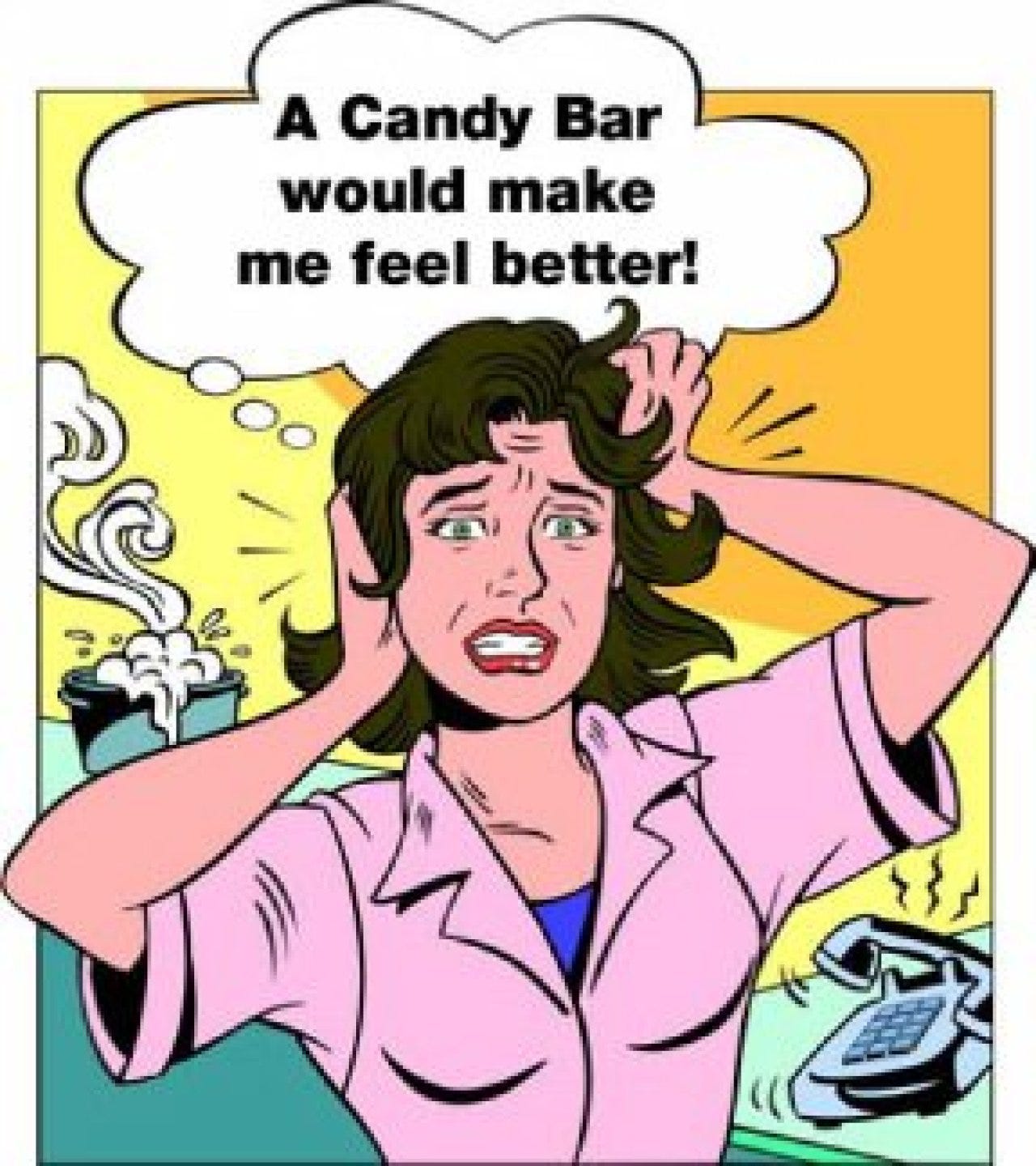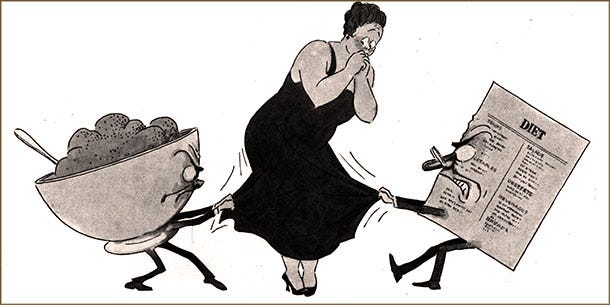Food, a cherished necessity in our lives, often becomes a source of comfort during times of heightened emotions. Experts suggest that emotional needs, rather than physical hunger, drive our eating habits in these moments. This is said to be particularly prevalent when feeling fatigued, stressed, overworked, bored, or sleep-deprived. Further, childhood trauma, social events, and celebrations are also said to trigger overeating as a response to emotional cues.
The problem with this perspective is that it’s ultimately backwards. While it is true that many people have built some habitual eating responses to emotional challenges, the reason rests on abhorrent food quality rather than on inherent psychological faults. These foods are responsible for bodily changes that cause emotional turmoil as the body searches for the specific nutrients it lacks.
The rationale behind my advocacy for this unique approach, distinct from other self-proclaimed "experts," is simple. My method focuses on self-help - acquiring knowledge, and adhering to a healthy diet that promotes bodily nourishment - as opposed to relying on quick fixes that address symptoms and necessitate expert intervention. It’s important to highlight that these experts stand to gain financially by offering their assistance, which may explain their hesitation to embrace my “unconventional” viewpoint.
Historical Emotional Eating?
Food plays a large role in our social interactions. It can be a source of pleasure and enjoyment for people, and it plays a vital role in our lives beyond just nourishment. It can bring people together and evoke positive memories, especially during holidays, special occasions or even sporting events.
Most people also enjoyed food historically in a balanced way. It was generally found natural and unprocessed, providing the essential nutrients that supported overall health and well-being. The emphasis on a balanced diet helped individuals maintain a healthier relationship with food and prevented the negative behaviors associated with disordered eating.
Today, much of that nourishment is lacking. Because many no longer make conscious, healthy choices, practice moderation, or tune into hunger and satiety cues, they fail to cultivate and maintain a positive relationship with food that prioritizes health and well-being.
When we are under consistent stress, lose sleep, reduce physical activity, or increase alcohol consumption, our body is in a weakened physical and mental state. Since the consumption of comfort (junk) foods can activate the same reward and pleasure centers in the brain that are typically associated with drug addiction, it feeds other triggers such as boredom, habit, fatigue or social influences. This underscores the powerful impact that certain unhealthy foods can have on our brain chemistry and mood.
It works the same way with hormonal imbalances; a fact particularly true for women, as fluctuations in estrogen and brain serotonin levels during the menstrual cycle can trigger cravings. The decrease in these feel-good hormones often leads to feelings of tiredness, lethargy, and depression, which signal the brain to seek energy through eating. This cycle often prompts reaching for quick-fix foods high in simple sugars, processed starches, and junk food, which may offer a temporary energy spike but will ultimately worsen emotional and physical well-being.
It’s worth noting that whole foods don’t stimulate the reward and pleasure centers in the brain even near as strongly as ultra-processed foods do. By avoiding refined carbohydrates, sugars, unhealthy fats, chemicals, additives and pesticides, the body's hormonal responses, blood sugar levels, and fatigue can be significantly reduced.
True “Emotional” Triggers
How do junk foods affect us emotionally? For one, they’re nutrient deficient, causing physiological and psychological reactions. We need sufficient nutrients and if we don’t get them, bad things happen.
Second, unhealthy food ingredients can lead to fluctuations in blood sugar levels and neurotransmitter activity in the brain. Consequently, emotional eating turns into a vicious cycle where someone may seek solutions to soothe feelings triggered by the very foods they’re consuming.
Here’s why we enter emotional turmoil in detail:
Blood sugar fluctuations: Consuming foods that are high in sugar or refined carbohydrates can cause rapid spikes and drops in blood sugar levels, leading to irritability, fatigue, and mood swings.
Inflammation: Low-nutrient foods, highly processed ingredients can contribute to inflammation in the body that’s been linked to mood disorders, such as depression and anxiety.
Gut-brain connection: The gut is often referred to as the "second brain" due to its complex network of neurons and its role in producing neurotransmitters that impact mood and emotions. Consuming low-nutrient foods can negatively affect the composition of the gut microbiota and disturb the gut-brain axis, influencing mood disorders and emotional disturbances.
Leptin resistance: Obese individuals may experience dysregulation in hunger hormones such as ghrelin, which stimulates appetite, and peptide YY, which promotes feelings of fullness. These imbalances can disrupt the body's ability to effectively regulate hunger and satiety cues, contributing to overeating.
Dopamine response: Junk foods can activate reward centers in the brain and trigger the release of dopamine, a neurotransmitter associated with pleasure and motivation. This leads to a greater drive to consume food for emotional and hedonic reasons, rather than physiological hunger.
Fixing The Problem
Not all food harms us. The trick is to develop a healthy relationship with food, not get caught up with unhealthy diets or restrictions. We have to find a balance between enjoyment and pleasure for the sake of its wonderful taste and nourishment.
Still, it is common for people to turn to food for comfort as a way to cope with big, difficult feelings, so it should be no surprise that our emotions are tied into junk food intake. These changes aren’t generally acknowledged by the medical profession and so therapy is misguided and misdirected towards medical intervention.
The Academy of Nutrition and Dietetics, for example, paints emotional eating as an eating disorder based on mental issues. Then they give cringeworthy and ineffective advice such as using coping strategies in this state. But being told to to value yourself or start an emotional diary misses the mark by a country mile.
Think about it. It’s not that so many people have emotional issues causing them to eat, but rather that they eat unhealthy foods that cause emotional issues. That’s probably why I can’t remember anyone ever telling me that they can’t stop eating potato salad or peas, but chips or ice cream - definitely!
The most efficient method to overcome emotional eating is by altering our eating habits. Prioritizing the quality and quantity of food (via moderation) is crucial in regulating bodily functions, ultimately enabling the restoration of physical and mental well-being. While this approach may not align with traditional psychological theories, it effectively addresses the root cause of the issue.
Change Behaviors: Eliminate all unhealthy snacks from your house and ensure they are not brought back in. The primary catalyst for emotional overeating isn’t solely stress, boredom, or sadness, but rather the recollection of how your mind reacts to the processed junk food you consume. You remember the rush of dopamine and the surge of energy it delivers, creating a desire for more in your body.
Find Alternatives: Fill your pantry with healthy snack options such as fruits, veggies, nuts, or plain yogurt to curb your cravings. Nourishing foods are less likely to lead to excessive eating and don’t contribute to emotional pitfalls, as they supply the body with essential nutrients.
Practice Mindful Eating: Prior to reaching for unhealthy snacks, pause and question whether you’re genuinely hungry. Mindful eating involves being present and aware of your food choices, helping you make more conscious decisions. Remember, physical hunger starts gradually in the stomach (through growling) and that feeling is satisfied once the stomach is full. Emotional hunger happens suddenly and feels urgent, is directed towards specific comfort foods and you’re only satisfied when uncomfortably full.
Cause and Effect: Most people eat and never understand the value of their food. Keep in mind that food doesn’t just fill you up but it also nourishes you. Knowing about cause and effect of our eating habits provides a deeper understanding of overall well-being and equips us in making informed choices that prioritize long-term health. This avoids weight gain, decreased energy levels, and risk of chronic diseases.
Exercise: Regular physical activity brings several physiological mechanisms into play that can influence how we feel. It has the potential to reduce hunger by regulating hunger hormones, alleviate stress by lowering cortisol levels and releasing endorphins, natural mood enhancers, that enhance emotional control and resilience. Exercise also combats boredom and maintains energy balance to prevent fluctuating hunger levels and emotional eating tendencies.
Emotional eating is a multifaceted behavior shaped by various factors, and addressing the issue requires more than just psychological or medical interventions. The emotional component is a symptom that has to be examined through the root causes of a modern-day disordered lifestyle, environmental influences, chemical exposures, and other factors that differ significantly from past eras.
When dealing with emotional reactions to food, consider opting for healthier alternatives. Keep in mind that these emotional responses serve as internal signals that your body requires better nutrition to function well and avoid causing daily emotional turmoil. Here are some nutritious snack options to fulfill cravings without introducing additional issues:
A cup of green tea
Plain yogurt with peaches
An apple with natural peanut butter. It's amazing what the calming effect these foods have.
A small bowl of oatmeal or any cereal that you have to cook
Brown rice with veggies
Sweet potato soup
If you are currently on a diet full of highly processed foods containing large amounts of refined sugar and sodium, don’t start by excluding anything in your diet, but rather by INCLUDING a lot of healthy whole foods that crush your cravings, but won’t put on extra weight.
I’ve included a link to clean eating recipes that will help you here, by The Clean Eating Couple. Buy tons of vegetables, a lot of fruit, a reasonable amount of protein, and healthy carbohydrates. You will most likely reduce the amount of processed food in your cart by 80% simply because your cart is already full.
Experts continually push us towards seeking support from a healthcare provider or mental health professional to deal with emotional eating patterns. A wiser approach is addressing root causes such as excess stress, sedentary lifestyles, or unhealthy eating, to change our thinking and ultimately improve health outcomes.








